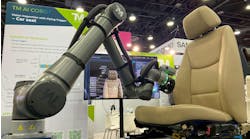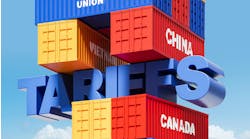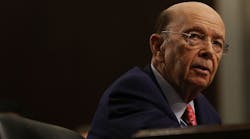Billionaire Wilbur Ross, nominated by Donald Trump to serve as Commerce secretary, called China the most protectionist of the world’s major economies and vowed to level the playing field with the Chinese on trade, especially in reducing overcapacity in its steel industry.
“China is the most protectionist country of very large countries,” Ross said in testimony on Wednesday in Washington before the Senate Commerce Committee, which will vote on his nomination. “They have both very high tariff barriers and very high non-tariff trade barriers. So they talk much more about free trade than they actually practice.”
Ross, 79, also said the Trump administration will quickly move to redefine relations with Mexico and Canada under the North American Free Trade Agreement.
“NAFTA is logically the first thing for us to deal with,” he said. “We have to solidify the relationships in the best way we can in our territory before we go off to other jurisdictions.”
Earlier, Ross warned America’s trading partners to practice “fair trade” and cut state control over business if they want access to the world’s biggest economy.
“The United States should provide that access to nations who agree to play by our standards of fair trade,” he said. “We should not put up with malicious trading activities, state-owned enterprises or subsidized production.”
Shares of American metal producers including Alcoa Corp. and Nucor Corp. rose as Ross railed against foreign dumping in the U.S. market and other unfair trade practices.
Steel Tariffs
While Ross didn’t mention any country by name in his opening remarks, the reference to state-led business and subsidized production could be seen as an indirect jab at Beijing. He said more attention must focus on anti-dumping tariffs for steel and aluminum. The U.S. recently launched a complaint to the World Trade Organization alleging that China has been suppressing aluminum prices by subsidizing domestic producers.
President-elect Trump, who will be inaugurated Friday, has promised to take a tougher approach toward China and to renegotiate the 23-year-old NAFTA, which he has called a “disaster.”
Turning to the issues at home, Ross said the infrastructure needs of the U.S. are “monumental,” and he advocated some amount of deregulation and corporate tax reductions to help American businesses be competitive and to attract investment from foreign business.
Ross would be one of the most seasoned business leaders on Trump’s economic team. As a private-equity investor, he restructured companies across a range of industries including steel, banking and textiles. Bloomberg values his fortune at $2.9 billion, and in financial disclosures released Tuesday, he revealed assets topping $336 million, including at least $150 million held in bank accounts and an art collection worth more than $50 million.
Senator Marco Rubio, a Florida Republican who introduced Ross at the hearing, said Ross has valuable business experience and created jobs in many sectors of the economy. As a cabinet member, he’ll be able to connect policy debates to what’s happening in the real world, Rubio said.
Direct Experience
In his opening remarks on Wednesday, Ross said the companies he’s invested in operated in 23 countries, and he’s been in complicated situations involving the U.S. manufacturing sector. He said he’s probably had more direct experience than any cabinet nominee with unfair trade practices such as non-tariff barriers and state subsidies of foreign exports.
“I am not anti-trade,” he said. “I am pro-trade. But I am pro-sensible trade, not trade that is detrimental to the American worker and to the domestic manufacturing base.”
Ross’s vast business holdings may open him to the same line of attack Mitt Romney faced when he ran for president in 2012 -- that he was a corporate raider who flipped companies for profit while laying off American workers. The Center for American Progress, a left-leaning think tank, says Ross’s corporate holdings represent a conflict of interest.
Ethics Agreement
In an ethics agreement released Tuesday, Ross said he’ll resign his positions with 38 entities. Those include Invesco Ltd., which bought Ross’s private-equity firm in 2006, as well as seven named subsidiaries. He will also divest his stakes in publicly traded companies and some bond positions within 90 days of confirmation and his interests in WL Ross private equity funds, which are less liquid, within 180 days of his being confirmed.
Ross has set an example in avoiding business conflicts that Trump should imitate, Bill Nelson, ranking Democrat on the Senate Commerce Committee, said at the opening of Ross’s hearing. He is positioned to elevate the status of the Commerce Department and help lead Trump’s trade agenda, he said.
“In recent years the Commerce secretary post has not been one of the most sought after or appreciated positions in Washington. But I have a feeling that’s about to change in a big way," Nelson said.










